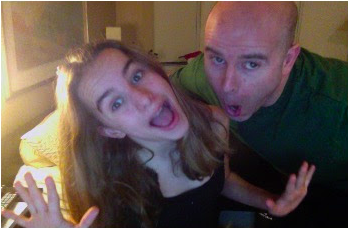When Your Teen Pulls Away: What to Do Before the Silence Becomes a Wall
It Doesn’t Happen Overnight.
People often comment on how much they love the fun photos of Maddie and me. We certainly loved one another, but it wasn’t without its fair share of tension at times. We don’t tend to capture those events. She suddenly went from someone who shared everything to someone who went inward. That can be devastating for a single dad trying to navigate female adolescence for the first time. You go through a lot of self-doubt. I leaned on my former girlfriend’s expertise, who successfully navigated raising three girls. I made many mistakes, and then my daughter went silent on me. I learned so much during that time with Maddie, mostly because I didn’t know what I didn’t know. I have news for you: you become much wiser through the teen years, from child one to child three.
One day, your teen fills the car ride home with stories and questions.
The next is one-word answers. Or silence. Or doors quietly closing. Or doors being slammed.
You haven’t had a blowout.
You’re still showing up.
But something has shifted, and you can feel it in your chest.
If you’re here, reading this, chances are you’re in that quiet, heartbreaking space parents rarely talk about:
The space where love is still present, but connection is fading.
And you’re wondering… What now?
This Isn’t About You “Failing”
Let’s name something immediately: You’re not failing as a parent.
You’re likely a competent, composed, high-functioning person people come to in a crisis.
But what people don’t see is the quiet cost of always being the one holding things together.
Especially when the person you’re trying hardest for, your teen, won’t let you in.
Here’s what’s hard to admit:
When your teen starts pulling away, it’s not always dramatic. Sometimes, it’s subtle.
And that makes it even more painful.
What’s Going On Beneath the Silence
Teens pull away for all kinds of reasons:
They’re overwhelmed and don’t know how to ask for help
They fear judgment or disappointment
They’re struggling to define who they are, separate from you
They’re experiencing anxiety, comparison, or self-doubt
But here’s what rarely gets said:
Sometimes, they’re not shutting down because they don’t want support.
They’re shutting down because they don’t know how to receive it from you.
This doesn’t mean you’re the problem.
It means you’ve reached the edge of what parenting alone can do.
That’s precisely where mentorship steps in.
Why Mentorship Works When Parenting Hits a Wall
Teens often need to hear a message from someone outside the emotional dynamics of home.
Someone who:
Isn’t trying to fix or rescue them
Isn’t emotionally tied to every decision they make
Can reflect their strengths, fears, and potential without judgment
A mentor is a neutral guide. Not a therapist, parent, or friend. A mentor helps your teen see themselves more clearly and confidently move forward.
And sometimes, hearing the right words from a different voice changes how the conversation hits home.
Think about it: the best coaches in the National Hockey League (NHL) are arguably some of the best coaches in the world. They can win the Stanley Cup one year and miss the playoffs the following year, resulting in his firing. Did the coach suddenly become a worse coach? No. He lost the room, and he became more of a talking puppet. The players stopped playing for them. The voice goes from inspiring to annoying.
You’ve just lost the room with your kids for a little while. Your voice is a little annoying to them right now. Don’t worry. They usually come back. Congratulations, you went more than a decade without them wanting to fire you.
There is a way to get them back faster.
What You Can Do Right Now
If you’re seeing signs of withdrawal, here are a few first steps:
1. Acknowledge What’s Shifted (Without Forcing a Fix)
Say something like:
“I’ve noticed we don’t talk as much lately. I miss you. I’m here when you’re ready.” We had a special moment that warmed my heart, and I'm guessing his, too.
That communicates love without pressure. I did this with my older son, Zac. We were still close, but I didn’t feel the closeness we used to have. It created an opportunity for a new conversation and a different perspective.
2. Get Curious, Not Controlling
Teens can tell when a question is a disguised lecture.
Try shifting from:
“What’s going on with you?”
To:
“How have things been feeling lately?”
3. Introduce the Concept of a Mentor (With Permission)
Say something like:
“I heard about this program where teens talk to mentors who just… get it. They’re not teachers or therapists. just real people who help with confidence, purpose, and figuring stuff out. No pressure, but I'll support you if you ever want to check it out.”
Don’t Wait for a Crisis to Create Connection
The fact that you’re here, reading this, means one powerful thing:
You’re still in the game.
Still trying. Still loving.
Still willing to believe that trust can be rebuilt with the proper support.
Mentorship isn’t a replacement for you.
It’s a bridge back to you.
💬 Ready to Take the Next Step?
Don’t Wait for a Crisis to Reconnect.
The longer the silence lasts, the harder it is to break through. But the fact that you're here says something important:
You haven’t given up.
You still care.
You still believe things can get better with the right support.
Mentorship isn’t a substitute for you.
It’s a pathway back to connection.
💬 Want to know if now’s the right time?
Let’s turn the silence into something stronger: trust, growth, and real connection.

